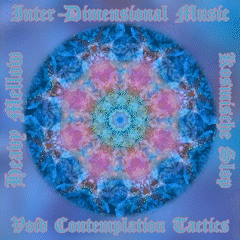ID Music: Carlo Rovelli
North America's Gnarliest Mix for being at home in nature while watching the demise of civilization
Inter-Dimensional Music is heard weekly on the actual airwaves of Marfa Public Radio, LOOKOUT FM Los Angeles, and WQRT Indianapolis. Scroll down for setlists and broadcast times.
Over the winter I started waking up between 3 and 4am, the interstitial zone where “up late” becomes “up early.” This is the vargtimmen or “hour of the wolf,” as famously described by Ingmar Bergman in notes on his 1968 horror film of the same name as . . .
. . . the hour when most people die, sleep is deepest, nightmares are most real. It is the hour when the sleepless are haunted by their worst anguish, when ghosts and demons are most powerful. The hour of the wolf is also the hour when most1 babies are born.
If I can’t get back to sleep after 10 or 15m of wandering thoughts and/or breathing exercises, I’ll get up. The common temptation is to reach for the phone and start doom-scrolling, prompting the question ...
And so I decided to try reading from the popular genre of contemporary nonfiction sometimes known as “theoretical physics for people who are not scientists and are possibly high.” Physicist Carlo Rovelli’s international bestseller Seven Brief Lessons on Physics was on my nightstand in February, and I featured his language for these two episodes of Inter-Dimensional Music.
Reading poetic attempts to talk about the general theory of relativity and/or quantum mechanics in a quasi-dream state worked out surprisingly well. It’s a lot like reading Deleuze and Guattari’s Mille Plateaux according to translator Massumi’s suggestion that you approach it like listening to an album. Or as Rovelli writes in Helgoland, “if what I have described seems perfectly clear, then it means that I have not been clear enough about it.” Quasi-dream states make it easier to let go of understanding and let thoughts flow.
Zen crossovers2 with physics are heady and cool but they also make people mad. Physics people sometimes get irritated because Zen’s metaphysical extrapolations on scientific theory are less than accurate. Zen people sometimes get annoyed at attempts to “prove” Buddhist metaphysics3 with physics. Zen may have fewer woo-woo elements than other practices, but it’s still ultimately a spiritual discipline that requires the bare minimum of faith4 in the idea5 that “don’t be a shit head” is good.
There are many profound and beautiful ideas in Rovelli’s books, but after reading myself back to sleep with thoughts on the interconnectedness of all things and “what is heat, actually” I kept coming back to a beautifully mournful passage at the end of Seven Brief Lessons. “I believe that our species will not last long,” he writes …
It does not seem to be made of the stuff that has allowed the turtle, for example, to continue to exist more or less unchanged for hundreds of millions of years… We belong to a short-lived genus of species. All of our cousins are already extinct. What’s more, we do damage. The brutal climate and environmental changes that we have triggered are unlikely to spare us… We are perhaps the only species on Earth to be conscious of the inevitability of our individual mortality. I fear that soon we shall also have to become the only species that will knowingly watch the coming of its own collective demise, or at least the demise of its civilization… As we know more or less well how to deal with our individual mortality, so we will deal with the collapse of our civilization.
Absolutely brutal!
This isn’t a warning or a call to action. It’s sorrowful acceptance that the demise of our civilization is as inevitable as our individual demise. It’s reluctant acceptance that the governmental and corporate entities that have the power to ease our suffering are not going to do that. They are often actively making it worse. So at least you can feel OK about forgetting your reusable grocery bags that one time.
Rovelli balances this sense of impending doom with a persistent sense of curiosity, naive wonder as a kind of spiritual resistance. He continues, “Nature is our home, and in nature we are at home…
This strange, multicolored, and astonishing world that we explore – where space is granular, time does not exist, and things are nowhere – is not something that estranges us from our true selves, for this is only what our natural curiosity reveals to us about the place of our dwelling. About the stuff of which we ourselves are made. We are made of the same stardust of which all things are made, and when we are immersed in suffering or when we are experiencing intense joy, we are being nothing other than what we can’t help but be: a part of our world.
This combination of acceptance of death and persistent wonder at life reminds me of the Joko Beck dharma talk that I reference all the time: The idea that “to do this [Zen] practice we have to give up hope…”
We have to give up this idea in our heads that somehow, if we could only figure it out, there's some way to have this perfect life that is just right for us. Life is the way it is. And only when we begin to give up those maneuvers does life begin to be more satisfactory.
The inevitability of the death of our selves, our friends, and our civilization isn’t something we can fix. We can ignore it, or we can sit with it. Just as I occasionally have to sit with the reality that I can’t get back to sleep. In giving up hope that things will work out how I want – or that I might greet the sunrise well-rested – I’m better prepared to fully experience “the hour when the sleepless are haunted by their worst anguish” as yet another part of “this strange, multicolored and astonishing world” that is our home. And from that place I can focus on doing the work of “not being a shit head” regardless of what comes next.
Thank you as always for reading, listening, opening the email, clicking the links, subscribing for free, subscribing for money, writing back, and for being part of our world.
Sleep tight,
DC
20220211 PROGRAM NOTES
North America's Gnarliest Mix for Being at Home in Nature
stream | download
For this week's session, an hour of crystalline exhaustion, space drum meditation, and ambient reggaeton inspired by candles and perfumes. We'll also explore a colorful ecosystem created by the ambient duo PJS, a long-form composition that features visual accompaniment from your host.
We'll hear complementary language on being at home in nature while contemplating the collapse of civilization from Carlo Rovelli.
artist - work
Jordan Christoff - June (excerpt)
Kheth Astron - Repeating Worldline
DJ Python - Angel
PJS - Eco
Space Drum Meditation - Oviraptor
Krallice - Crystalline Exhaustion
Only Now - Fires, Bodies, Slow Burn, No Wood
Jordan Christoff - June (excerpt)
Dharma: Carlo Rovelli
20220304 PROGRAM NOTES
North America's Gnarliest Mix for knowingly watching the demise of civilization
stream | download
This week's program features melodious Carnatic ragas, a fusion of Javanese mantras with outer-limits metal aesthetics, trance-inducing 4th-world polyrhythmic disco pulsations, and organic black metal about being bummed out in the desert.
Language throughout the broadcast on dealing with our individual mortality in tandem with the collapse of our civilization, from Carlo Rovelli.
artist - work
Ximes - Hallelujah Anyway (excerpt)
Alathur Brothers - Live at All India Radio (1963) (edit)
Rinuwat - Sewu
Luke Stewart - 07
Apparition - Entanglement
Çaykh - Soùmatra
Yellow Eyes - One Rock For The Wild Dog
Konduku - Mantar Kaya
Aggrovators - I'm Gone Dub
Ximes - Hallelujah Anyway (excerpt)
Dharma: Carlo Rovelli
You can support ID Music by sharing this post, subscribing, and/or purchasing music from the artists we play on our airwaves. Tell them where you heard their sounds if you want to go the extra mile! Breathe deep in the Bandcamp library.
I’m not sure if it’s actually the hour when “most” people are born and die. When I started as a medic on the ambulance my partner warned me that early morning calls often involved cardiac incidents, but this had more to do with the vagal maneuvers that accompany certain morning rituals. Finding people passed out on the toilet can be upsetting, but it’s not especially spooky.
See also Fritjof Capra’s The Tao of Physics and Gary Zukav’s The Dancing Wu Li Masters. Inter-Dimensional Music did a series of shows featuring excerpts from Tao of Physics in January 2020, and I featured his writing in the 2020413 installment of the Void Contemplation Tactics meditation video series alongside music from Mary Lattimore and Ornament. We’ll be using language from this VCT for the 20220422 edition of our program as well.
As Paula Arai writes in the introduction to Zenju Earthlyn Manuel’s The Shamanic Bones of Zen, “Perhaps the shamanic dimension of Zen has receded into the shadows because in America Zen is characterized as a tradition that cultivates the kind of thinking associated with a scientific perspective. A shamanic perspective is not incompatible with modern science, but those who prefer clear reasoning and being in control often downplay or ignore this central aspect of Zen.” More to come from Manuel’s excellent book in the near future.
By “faith” I mean as a Zen practitioner I don’t require proof to believe that being kind is good. Would you be less kind if studies showed that being a rude turd was good for your health?
This concept is expanded on at length by Brad Warner in Don’t Be a Jerk. The title is his loose translation of a line from Dõgen’s Shobogenzo: "Even if unwholesome action fills worlds upon worlds, and swallows up all things, refrain from is emancipation."










